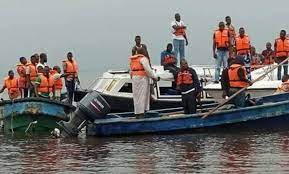
As a result of the lingering fuel scarcity and the absence of floating fuel stations, boat operators have been forced to resort to buying fuel in generator tanks, to avoid being arrested by the Police, for allegedly engaging in illegal bunkering and smuggling.
This is even as boat operators in Lagos have raised alarm over indiscriminate arrests of their members for purchasing fuel in jerry cans. The boat operators’ frustration stems from the lack of floating fuel stations or any other convenient means to purchase fuel for their operations.
Speaking with our correspondent last week, Lagos State Chapter Secretary of Association of the Association of Tourist Boat Operators and Water Transporters of Nigeria (ATBOWATON), Mr Ayomikun Aworetan, expressed outrage over the harassment faced by boat operators, explaining that their attempts to buy fuel for their boats have been met with suspicion and arrests by law enforcement agents particularly the Police.
As a result of these arrests, many boat operators have begun using generator tanks to purchase fuel, to avoid police scrutiny.
According to Aworetan, boat operators are often charged high fees after being arrested, with some of them being forced to pay as much as ₦20,000 to effect their release from Police stations.
While calling on the Nigerian Inland Waterways Authority (NIWA) and other relevant authorities to intervene in the matter, Aworetan emphasized that boat operators should be exempted from the restrictions on purchasing fuel in jerry cans, particularly as they have no other feasible options for refueling.
“Our boat operators are being arrested for buying fuel in jerry cans. It’s impossible for us to bring our boats directly to the fuel stations, so we rely on jerry cans. But now, the police are arresting our members and accusing them of smuggling. We are now forced to buy fuel in generator tanks, instead of jerry cans just to avoid getting arrested. This is how bad things have gotten.
“When you buy fuel in a jerry can and you are arrested, the police will charge you about ₦10,000 or N20,000 at the station, because they assume you’re involved in bunkering or black market activities. There is no floating petrol station or any designated fuel station on the water where we can refuel. We have no choice but to use jerry cans or generator tanks.
“Even with our ID cards, they still arrest us. They claim we’re involved in illegal activities simply for buying fuel in jerry cans. This is madness. We have an association, and our ID cards should be recognized. We should be allowed to buy fuel freely, whether in jerry cans or at designated stations. The absence of fuel depots along critical water routes, including the Badagry axis, has further worsened the situation, leaving boat operators with limited alternatives. There are no fuel depots along our routes. The only option is to buy fuel in jerry cans or generator tanks, but even that has become risky,” Aworetan lamented.
Also speaking, the Liverpool (Apapa) Unit Chairman of the Maritime Workers Union of Nigeria (MWUN), Comrade Ayeyemi Omosuyi highlighted their frustrations with the current fuel supply chain, describing how operators have been forced to turn to the black market due to a lack of legitimate fuel sources.
In a bid to resolve the issue, Omosuyi revealed that he had reached out to local authorities, including the Area ‘B’ Police Commander with hopes of securing fuel through approved channels. However, he said their situation has been further complicated by the actions of the local fuel stations, who allegedly sell fuel at night but refuse to supply the operators during regular hours.
Omosuyi confirmed that the MWUN branch office and the branch president have been notified, and they are now expected to escalate the issue.
“We don’t have access to fuel to operate our boats. What we are forced to buy is black market fuel. I wrote to the area commander, requesting that we be allowed to buy fuel using our ID cards. Unfortunately, even then, we are restricted to just 50 litres, which is not enough for sustained operations. The fuel stations sell fuel to undisclosed buyers at night. During the day, they tell us to bring our boats.
“I have submitted reports to both the Area commander and our branch president. We are waiting for them to take action,” Omosuyi noted.
The National Public Relations Officer of Waterfront Boat Owners and Transporters Association of Nigeria Waters (WABOTAN), Chief Raymond Gold confirmed the current plight of the boat operators. He explained that many boat operators, in fear of being accused of illegal bunkering or pipeline vandalism, have had to adopt creative but laborious methods to refuel their boats.
Chief Gold lamented that the economic impact of this situation is dire, with boat operators struggling to maintain their livelihoods. He also noted that despite having identification and proof of their operations, boat operators are still harassed and accused of engaging in illegal activities.
In response to boat operators exploring options to address the issue, the WABOTAN spokesman urged members to stay on the right side of the law, even if it means adopting inconvenient practices like using generator tanks to refuel.
“It’s a pathetic situation. The hike in fuel prices has not only affected the cost of transportation on water, but it has also led to the indiscriminate arrest of boat operators for simply buying fuel in jerry cans. The authorities seem to misunderstand the challenges we face. Boat operators now carry generator tanks to the fuel stations to buy petrol, as a way to avoid being arrested for using jerry cans”, Gold also explained.















